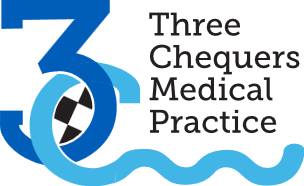The Fluenz Vaccine For Children
The following information should help parents trying to decide what action they should take over organising Fluenz vaccinations for their children, or what expectations they can have of their child's school.
Who will give the children's flu vaccination?
Children aged 2- 3 as of August 31 2022 (born between 1st September 2018 and 31st August 2020) are eligible for their free nasal Flu vaccination at Three Chequers Medical Practice. Please call to book an appointment.

Children who are 4 years old are also eligible for flu vaccination provided they were 3 on August 31 2022. These children can have the vaccination here at Three Chequers Medical Practice. Please call to book an appointment.
Children in Reception class and school years 1, 2, 3, 4 and 5 will be offered their vaccination in school. In a couple of areas, it might be offered in primary care settings.
Children who are home educated will also be offered the vaccine, provided they are in an eligible age group. Parents can obtain information about arrangements from their local NHS England Public Health Commissioning team. Please call your surgery to book.
Children who board in a dormitory situation will be offered the vaccine by their school and this will be carried out at school.
If your child misses the flu jab for any reason at school, you should phone the Child Health number on Tel:0300 247 0090.
Children at higher risk from flu
Children aged 2 to 17 with long-term health conditions such as diabetes are at higher risk from flu. It's especially important that they are vaccinated with the annual flu nasal spray instead of the annual flu jab, which they were previously given.
Children between the ages of 6 months and 2 years who are at high risk from flu are offered the annual flu jab, usually at their GP surgery.
What are the side effects of the flu vaccine for children?
The nasal spray flu vaccine has few side effects – most commonly getting a runny nose after vaccination for a few days.
Click here to read more about the side effects of the flu vaccine for children.
How to get the flu vaccine for your child
Talk to the GP, practice nurse or your child's school nurse if you want more information about when and how your child will be vaccinated against flu.
Please contact your surgery directly to make an appointment.
How is the nasal spray flu vaccine given?
The vaccine is given as a single spray squirted up each nostril. Not only is it needle-free – a big advantage for children – the nasal spray is quick, painless, and works even better than the injected flu vaccine.
The vaccine is absorbed very quickly. It will still work even if, after the vaccination, your child develops a runny nose, sneezes or blows their nose.
Patient information leaflet for the nasal spray flu vaccine
Are there any children who should delay having the nasal spray flu vaccine?
Children should have their nasal spray flu vaccination delayed if they:
- are unwell with a fever
- are wheezy
If your child has a fever, the vaccination can be delayed until they feel better.
If a child is wheezy or has been wheezy in the past week, their vaccination should be postponed until they have been wheeze-free for at least 3 days.
If a child has a heavily blocked or runny nose, it might stop the vaccine getting into their system. In this case, their flu vaccination can be postponed until their nasal symptoms have cleared up.
Are there any children who should not have the nasal spray flu vaccine?
There are a few children who should avoid the nasal spray flu vaccine.
The vaccine is not recommended for children who have:
- a severely weakened immune system
- severe egg allergy
- severe asthma – that is, those being treated with steroid tablets or high-dose inhaled steroids
- an allergy to any of the vaccine ingredients, such as neomycin
- a condition that requires salicylate treatment
If your child is at high risk of flu due to one or more medical conditions or treatments, and can't have the nasal flu vaccine because of this, they should have the injected flu vaccine.
If you're unsure, check with the school immunisation team or the school nurse or ask for information from a nurse at your surgery.
Why children are offered flu vaccine
Flu is a very common infection in babies and children, and it can be very unpleasant for them. Children with flu have the same symptoms as adults – including fever, chills, aching muscles, headache, stuffy nose, dry cough and a sore throat lasting up to a week. Some children develop a very high fever or complications of flu, such as bronchitis, pneumonia and a painful ear infection. They may need hospital treatment, and very occasionally a child may die from flu. In fact, healthy children under the age of 5 are more likely to have to be admitted to hospital with flu than any other age group.
For children with long-term health conditions such as diabetes, asthma, heart disease or lung disease, getting flu can be very serious as they are more at risk of developing serious complications.
Click here to learn more about protecting your child from flu.
INDEX - Services
We use cookies to help provide you with the best possible online experience.
By using this site, you agree that we may store and access cookies on your device. Cookie policy.
Cookie settings.
Functional Cookies
Functional Cookies are enabled by default at all times so that we can save your preferences for cookie settings and ensure site works and delivers best experience.
3rd Party Cookies
This website uses Google Analytics to collect anonymous information such as the number of visitors to the site, and the most popular pages.
Keeping this cookie enabled helps us to improve our website.

